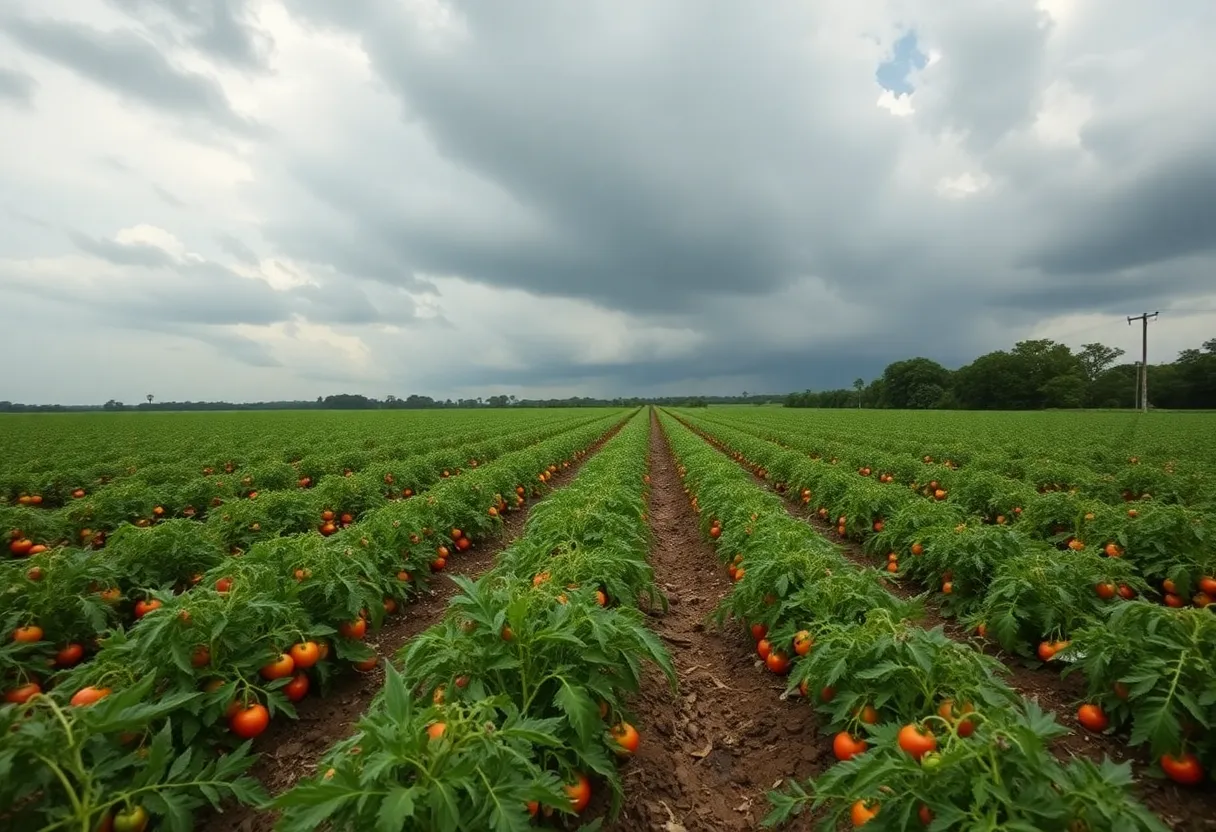

South Florida Tomato Fields
Want to target the right audience? Sponsor our site and choose your specific industry to connect with a relevant audience.
Prominent brand mentions across targeted, industry-focused articles
High-visibility placements that speak directly to an engaged local audience
Guaranteed coverage that maximizes exposure and reinforces your brand presence
Interested in seeing what sponsored content looks like on our platform?
May’s Roofing & Contracting
Forwal Construction
NSC Clips
Real Internet Sales
Suited
Florida4Golf
Click the button below to sponsor our articles:
Sponsor Our ArticlesFarmers in South Florida are grappling with a severe agricultural crisis as tomato prices plummet to unsustainable levels. With costs significantly rising and competition from Mexican imports flooding the market, many local growers are forced to discard crops rather than harvest. Additionally, a labor shortage fueled by immigration policy changes complicates their ability to maintain production. As these challenges mount, the future viability of farming in South Florida is increasingly uncertain, impacting both the local economy and food supply chains.
South Florida is currently facing a significant agricultural crisis as farmers are confronted with plummeting prices and logistical challenges that force them to waste crops, particularly tomatoes. The cost of labor paired with high agricultural input expenses has made it less viable for farmers to harvest their produce. This situation has prompted many farmers to plow under crops instead of bringing them to market.
The price of a box of tomatoes has seen a dramatic drop, going from around $16 to as low as $3 to $4. Farmers report that they need to sell tomatoes for at least $10 to $11 per box just to break even. Currently, many are selling at a loss, with prices ranging between $3 and $5. This price decline has been largely attributed to increased competition from Mexican imports, which has saturated the market in the U.S. In light of this market saturation, an anti-dumping duty on fresh Mexican tomatoes is expected to be implemented in July to reduce the negative impact of these low prices.
Beyond tomato production, Florida’s agricultural sector is suffering from other significant challenges. The imposition of a 25% tariff on exports to Canada has particularly affected farmers of watermelons, pushing some Canadian buyers to seek alternative sources from Mexico. This shift threatens the already precarious position of Florida’s watermelon market.
Compounding these issues is the changing landscape of farm labor. Immigration policy shifts have created a climate of fear among workers, leading to a noticeable decline in available labor. Many farm workers have reportedly left the industry due to concerns over deportation. This shortage of labor has further exacerbated crop losses, as many fruits and vegetables remain unharvested.
Overall, the sentiment among South Florida farmers is extremely pessimistic. There is a widespread feeling of insecurity regarding the future of their farms, exacerbated by the ongoing trade wars and shifts in immigration policy. The volume of tomato imports has reached alarming levels, making up over 70% of the U.S. market share. This significant reliance on imports threatens not only tomato growers but other local produce as well.
Historically, Florida’s tomato acreage has dramatically declined, going from approximately 61,800 acres in 1990 to around 23,000 acres today. The farmers’ outlook reflects a sobering reality that their struggles are part of a larger trend in American agriculture, where domestic growers are increasingly vulnerable to international competition.
With many consumers in the U.S. now preferring imported varieties of tomatoes—many of which are grown in greenhouses in Mexico—local farmers feel they are facing an uphill battle. The withdrawal of the U.S. government from a previous trade agreement aimed at protecting domestic growers is viewed as a critical response to counter unfair pricing from Mexico.
As the situation continues to unfold, both farmers and agricultural advocates in South Florida are calling for solutions that would ensure fair prices and adequate labor resources, allowing them to remain viable in a rapidly changing market. Without intervention, the future of farming in this important agricultural region remains uncertain, putting additional pressure on the local economy and food supply chain.
News Summary Cairo, GA has a new mayor following a special election in which Edgar…
News Summary A group of Florida A&M University stakeholders, including alumni, has filed a petition…
News Summary Florida lawmakers have approved a budget of $115.1 billion for the upcoming fiscal…
News Summary A federal judge has ruled Florida Attorney General James Uthmeier in civil contempt…
News Summary Washington State has approved a new sales tax on digital services, including advertising…
News Summary The Department of Homeland Security has announced a significant policy shift allowing increased…